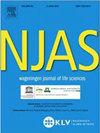Adoption of climate change adaptation strategies by maize-dependent smallholders in Ethiopia
Abstract
Climate change is an environmental process that is among the most limiting factors for increasing or even maintaining food production by small-farmer communities in Sub Saharan Africa (SSA). Adoption of climate change adaptation strategies that increase agricultural productivity and at the same time building farmers’ resilience capacity has become a top policy priority in SSA. In this study, we investigate how maize-dependent smallholders in Ethiopia adapt to climate change. Both household and plot-level data were collected, and subsequently analysed by a multivariate probit regression model. Results show that most climate change adaptation strategies implemented by maize-dependent smallholders, are complementary. Combining conservation tillage, mixed maize-legume cropping and terracing along with the use of drought-resistant maize varieties allows farmers to increase productivity while building resilience to climate change more than a subset of these strategies. Findings indicate that the likelihood of adopting soil and water conservation practices, drought-resistant maize varieties and chemical fertilizers significantly increase among young and male-headed households as well as farmers having confidence in extension agents and membership in local organisations. Hence, policies should aim at further building agricultural extension agents’ capacity by providing effective and continuous education and training on climate change impacts and responses. Promoting family ties and household memberships in local organisations through facilitating mutual cooperation and communication among farming communities would help to foster adoption of climate change adaptation strategies.

 求助内容:
求助内容: 应助结果提醒方式:
应助结果提醒方式:


